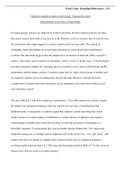Word Count (Excluding References): 1588
‘Statistics conceal as much as they reveal.’ Discuss this claim
with reference to two areas of knowledge.
For many people, statistics are understood in black and white. By their numerical nature, the ideas
they assert seem to have little, if any leeway at all. However, as far as statistics may be literally true,
the conclusions they might suggest in a reader’s mind can be far from valid. The concept of
misleading claims has perhaps never been more pertinent as in this current age of information
overload. The title claim suggests that all statistics have an element of mistruth, which ‘conceal’ a
subject’s true nature, and an element of elucidation, which ‘reveal’ it. In this essay, I will investigate
how these elements compare by examining the use of statistics in two Areas of Knowledge (AOK):
mathematics and the human sciences. I intend to argue that our widely flawed grasp of number and
the snapshots statistics give can significantly obscure the truth. However, with the necessary
considerations, I propose that these drawbacks can be mitigated to the extent that statistics reveal
more than they conceal.
The first AOK that I will be investigating is mathematics. To be fully understood, statistics require
the reader to be adequately numerate; after all, statistics are just ways of summarising data
mathematically. Consequently, it could be argued that statistics conceal more than they reveal,
simply because our understanding of mathematics is widely flawed. Compared to the original
understanding of number hard-wired into the brain, our present perception of mathematics is
incredibly unnatural. To demonstrate this, look no further than the Pirahã tribe. The Amazonian
indigenous group uses a counting system comprised only of the words ‘one’, ‘two’ and ‘many’, and
studies show they are unable to complete basic numerical tasks such as comparing quantities
involving numbers greater than 3 [1]. This raises the knowledge question (KQ) of ‘To what extent do
humans have inherent numerical understanding?’
, This suggests that humans lack an innate ability to numerically reason, and so our use of the Way of
Knowing (WOK) of reason to interpret statistics may not be logically coherent. Since most people
are educated, one might propose that this finding is not universally relevant. However, recent studies
indicate that the average person still lacks a well-rounded understanding of figures. For instance,
when the American restaurant A&W introduced the third-pound burger, one focus group study found
the reason sales were underwhelming was that the majority of consumers thought they’d get more
meat buying a quarter-pounder instead [2].
It is not only misunderstandings and fallacious reasoning that impede statistical comprehension,
though; there are deeper inbuilt reactions that are much harder to correct. In HL mathematics, I have
studied Bayes’ theorem, which calculates an event’s probability and is especially relevant in medical
testing. In his TED talk, the statistician Peter Donnelly outlines the following related situation [3]:
Consider a population of 1 million people, where a disease affects 1 in 10,000. A person tests
positive for the disease in a test that is correct 99% of the time. How likely is it that they are
infected? Despite the common impulse to say overwhelmingly likely, Donnelly explains there is a
less than 1% chance; this is due to our propensity to focus on the accuracy of individual tests, rather
than considering how scarce the disease is generally. When confronted by statistics we do not fully
understand, we often use our instinctual intuition to infer their implications. Given that the WOK of
intuition is tied strongly to intangible gut feelings and the WOK of emotion, it is dangerous for it to
influence our conclusions, since they may not be factually substantiated but instead influenced by
personal biases.
In counterclaim, one could argue that statistics are, in and of themselves, truthful. In other words,
statistics do not conceal the truth, but weaknesses in human understanding do. To illustrate this,




